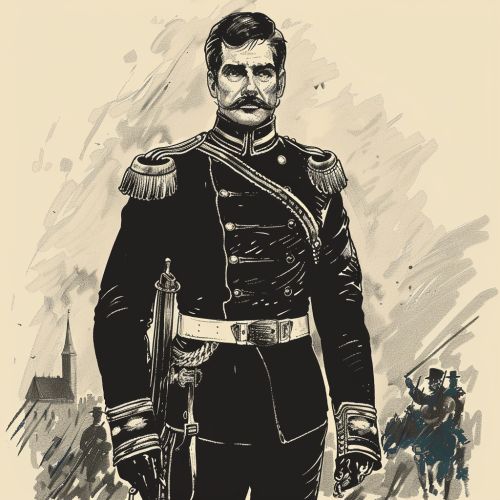The Flashman Papers
The Flashman Papers
The Flashman Papers are a series of historical novels written by George MacDonald Fraser. The series consists of twelve books, published between 1969 and 2005, and they follow the adventures of the fictional character Harry Flashman, a cowardly British soldier who is involved in many of the significant military and political events of the 19th century. The novels are presented as the supposedly discovered memoirs of Flashman, who first appeared as a bully in Thomas Hughes's 1857 novel Tom Brown's School Days.


Background and Structure
The Flashman Papers are written in the first person, with Flashman himself as the unreliable narrator. The novels are a blend of historical fact and fiction, with Flashman encountering real historical figures and events. Fraser meticulously researched the historical context for each novel, providing detailed footnotes and appendices to enhance the realism of the narrative.
The series begins with "Flashman" (1969), which covers Flashman's expulsion from Rugby School and his subsequent involvement in the First Anglo-Afghan War. Each subsequent novel follows Flashman through various historical episodes, including the Indian Rebellion of 1857, the American Civil War, and the Zulu War.
Main Themes
The Flashman Papers explore themes of cowardice, survival, and the nature of heroism. Flashman is depicted as a self-serving, amoral character who often finds himself in dangerous situations through no fault of his own. Despite his cowardice, he frequently emerges as a hero in the eyes of others, thanks to a combination of luck, cunning, and the incompetence of those around him.
The novels also provide a satirical commentary on Victorian society and the British Empire. Flashman's interactions with historical figures such as Queen Victoria, Otto von Bismarck, and Abraham Lincoln offer a cynical perspective on the politics and personalities of the time.
Historical Accuracy
Fraser's attention to historical detail is one of the defining features of the Flashman Papers. Each novel is set against a meticulously researched backdrop, with real historical events and figures woven into the narrative. Fraser's use of footnotes and appendices provides additional context and clarifies the distinction between historical fact and fictional embellishment.
For example, in "Flashman and the Great Game" (1975), Fraser provides detailed accounts of the Indian Rebellion of 1857, including the Siege of Cawnpore and the Relief of Lucknow. Flashman's involvement in these events is fictional, but the descriptions of the battles and the historical figures involved are based on extensive research.
Literary Style
The Flashman Papers are characterized by their witty, irreverent tone and Flashman's distinctive narrative voice. Fraser's writing is marked by its use of period-appropriate language and idioms, as well as its satirical humor. Flashman's self-deprecating and often vulgar commentary provides a counterpoint to the more serious historical content.
The novels also employ a non-linear narrative structure, with Flashman recounting his adventures out of chronological order. This allows Fraser to explore different periods and events without being constrained by a strict timeline.
Reception and Legacy
The Flashman Papers have been widely praised for their historical accuracy, humor, and originality. The series has a dedicated following and has been influential in the genre of historical fiction. Critics have lauded Fraser's ability to blend fact and fiction, as well as his skill in creating a complex and compelling anti-hero.
However, the novels have also faced criticism for their portrayal of race, gender, and colonialism. Flashman's attitudes and actions reflect the prejudices of his time, and some readers have found these depictions problematic. Fraser has defended his work as a satirical critique of Victorian society, but the controversy remains.
Adaptations
The Flashman Papers have been adapted for various media, including radio, television, and stage. In 1975, a film adaptation of "Royal Flash" was released, starring Malcolm McDowell as Flashman. The film was directed by Richard Lester and featured a screenplay co-written by Fraser himself. Despite its star-studded cast and faithful adaptation of the source material, the film received mixed reviews and was not a commercial success.
There have also been several radio adaptations of the novels, produced by the BBC. These adaptations have generally been well-received and have helped to introduce the series to a wider audience.
Influence on Historical Fiction
The Flashman Papers have had a significant impact on the genre of historical fiction. Fraser's blend of meticulous research, engaging storytelling, and satirical humor has inspired numerous writers and has set a high standard for historical accuracy in fiction. The series has also contributed to the popularity of the anti-hero archetype in literature.
Authors such as Bernard Cornwell, known for his Sharpe series, and Patrick O'Brian, author of the Aubrey-Maturin series, have cited Fraser as an influence on their work. The Flashman Papers have also been credited with revitalizing interest in 19th-century history and the British Empire.
Conclusion
The Flashman Papers remain a landmark in historical fiction, offering a unique blend of adventure, humor, and historical insight. George MacDonald Fraser's creation of Harry Flashman as a flawed yet fascinating protagonist has left a lasting legacy in literature. The series continues to be celebrated for its historical accuracy, narrative style, and satirical critique of Victorian society.
